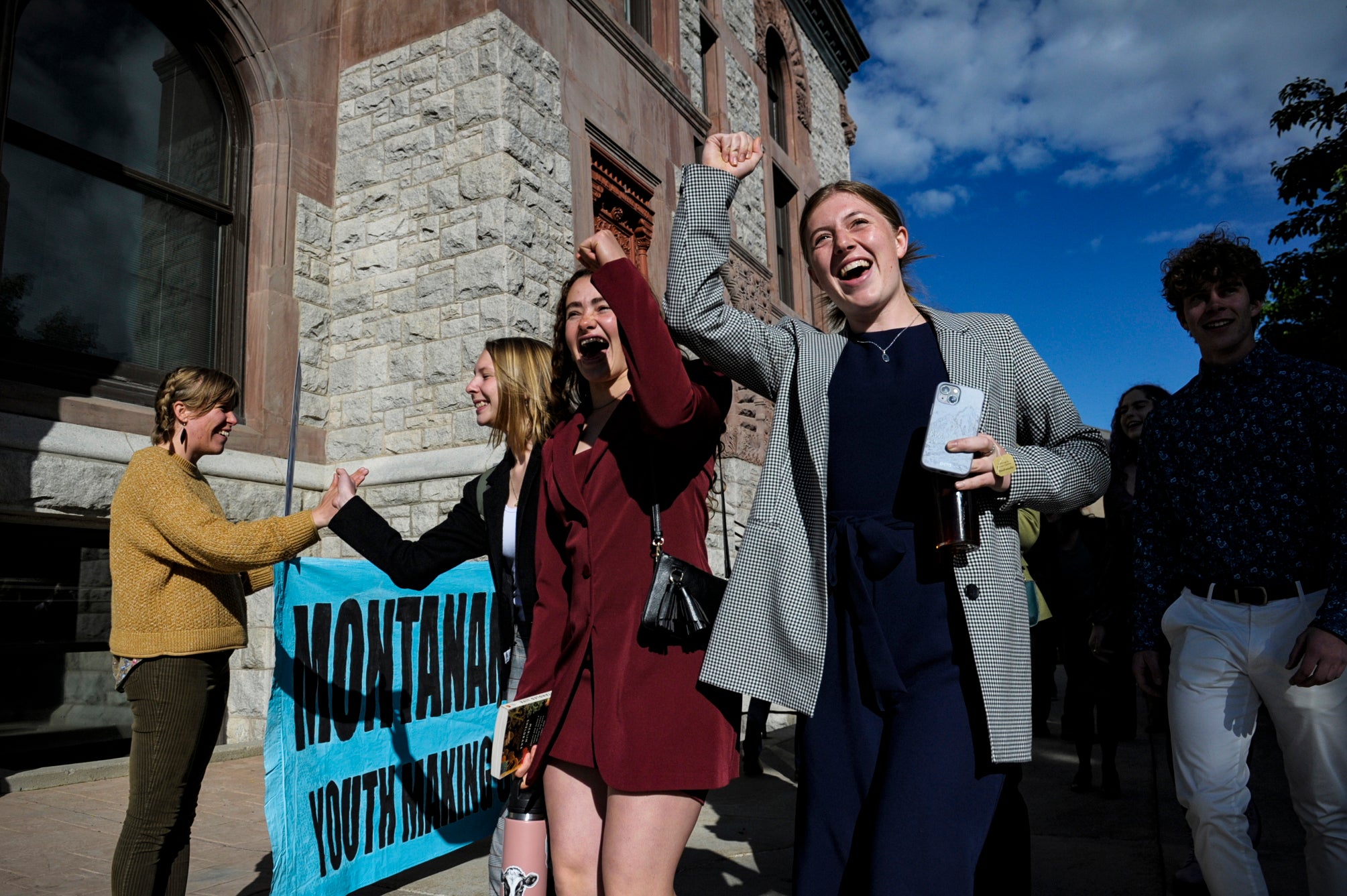Youth activists win unprecedented victory in suit suing Montana for ignoring climate change
Lawsuit from Montana climate activists is first such youth-led case to go to trial and win
Montana violated a provision in the state constitution guaranteeing citizens a “clean and healthful environment” by declining to consider the climate impacts of fossil fuel projects, a judge ruled Monday in a landmark lawsuit brought by youth climate activists.
“Montana’s (greenhouse gas) emissions and climate change have been proven to be a substantial factor in causing climate impacts to Montana’s environment and harm and injury to the youth plaintiffs,” Lewis and Clark County District Court Judge Kathy Seeley wrote in her ruling.
“Plaintiffs have a fundamental constitutional right to a clean and healthful environment, “ she added.

The plaintiffs, a group of Montana residents aged 5 to 22, are the first such youth-led group to take a state government to trial on climate claims and win.
“My initial reaction is, we’re pretty over the moon,” Melissa Hornbein of the Western Environmental Law Center, which helped bring the suit along with the non-profit Our Children’s Trust, told The Guardian on Monday. “It’s a very good order.”
The dispute at the heart of the 2020 lawsuit concerned a provision of the Montana Environmental Policy Act (MEPA), which prevented the state from considering the climate impacts of energy projects it was permitting.
Monday’s ruling struck down that provision, finding that it violated the environmental rights found in the state constitution.
The Montana Attorney General’s Office said it would appeal the “absurd” ruling.
“Montanans can’t be blamed for changing the climate — even the plaintiffs’ expert witnesses agreed that our state has no impact on the global climate,” Emily Flower, spokeswoman for Attorney General Knudsen, told The Independent in a statement.
“Their same legal theory has been thrown out of federal court and courts in more than a dozen states,” she continued. “It should have been here as well, but they found an ideological judge who bent over backward to allow the case to move forward and earn herself a spot in their next documentary.”
During a week-long trial in June, the plaintiffs argued the state’s failure to consider climate impacts while it was expanding fossil fuel infrastructure like coal mines and power plants amounted to a “pervasive systemic infringement of rights.”
They argued the climate crisis was manifesting in Montana in a variety of daily ways, from wildfire smoke causing breathing problems to Native Americans losing the ability to seek traditional food sources.
“It feels like it’s suffocating me, like if I’m outside for minutes,” University of Montana student Olivia Vesovich, 20, testified during the trial. “Climate change is wreaking so much havoc on our world right now and I know that will only be getting worse.”
The state argued that Montana makes only a negligible contribution to the overall climate crisis.
Montana Assistant Attorney General Michael Russel told the court that plaintiffs were trying to bring forward “political grievances that properly belong in the Legislature, not a court of law.”
The decision may have an important legacy as a legal precedent, but only a modest impact in Montana itself.
State regulators testified during the trial that they can’t legally reject projects that comply with the law, even if the proposed developments add to the climate crisis.
“We do not have the authority to not permit something that fully complies with the law,” Department of Environmental Quality Director Chris Dorrington told the court in June. “We are not the ones that created the law. We are the ones that implement the law.”
Officials said the MEPA was a “procedural” act, and that they could only reject projects that broke state law like the Clean Air Act of Montana.
Youth activists are increasingly attempting to push forward climate actions in the court, but they have faced an uphill battle in the US.
At least 14 lawsuits from youth activists seeking to hold state bodies accountable for violating climate rights have been dismissed, according to a July report from the United Nations Environment Program and Columbia University’s Sabin Center for Climate Change Law.
“People around the world are watching this case,” Michael Gerrard of the Sabin Center told The Washington Post.
Progressives cheered on the ruling.
“Thank you to these brave young people who today won an enormous victory against climate change in their home state of Montana,” Senator Bernie Sanders wrote on X on Monday. “It’s time for the fed[eral] gov[ernment] to follow their example and file lawsuits to hold the fossil fuel industry accountable for their role in the climate crisis.”
Join our commenting forum
Join thought-provoking conversations, follow other Independent readers and see their replies
Comments


Bookmark popover
Removed from bookmarks